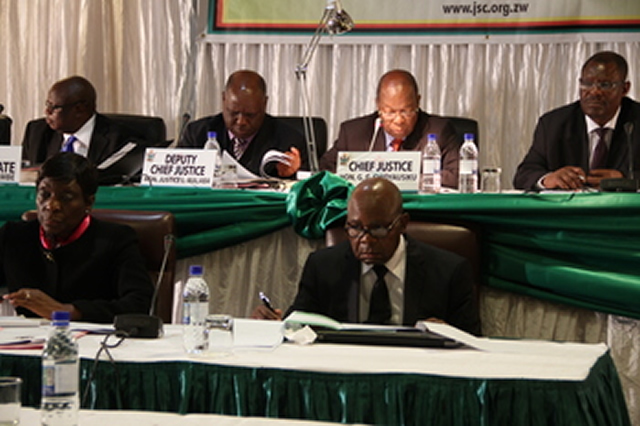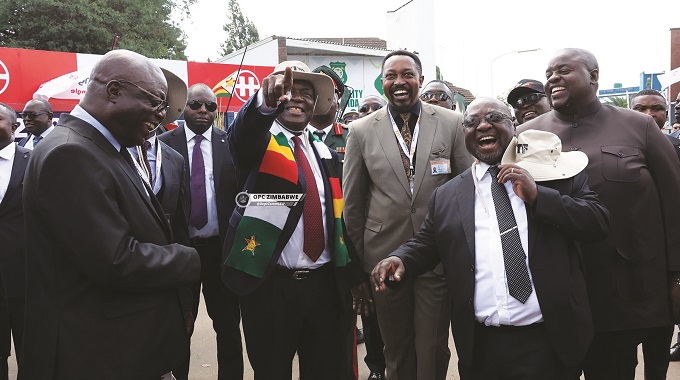Aspiring Supreme Court judges grilled


Judicial Service Commission members, Chief Justice Godfrey Chidyausiku flanked by Deputy Chief Justice Luke Malaba and Judge President George Chiweshe and Chief Magistrate Mishrod Guvamombe (left) and below Justice Rita Makarau and Human Rights consultant Richard Makoni, follow proceedings during interviews for aspiring Supreme Court judges in Harare yesterday. — (Picture by Justin Mutenda)
Peter Matambanadzo and Fidelis Munyoro Harare Bureau
High Court Judge Justice Charles Hungwe was yesterday grilled by Judicial Service Commissioners during public interviews to select Supreme Court judges.Justice Hungwe was grilled over an incident in which a woman died while in his company, which they felt compromised his integrity.
Other judges were criticised by the panel for failing to explain simple court procedures.
Justice Hungwe said he regretted the Bindura incident after being quizzed if he thought the incident had an effect on his integrity and if it would not compromise his appointment to the Supreme Court bench. Justice Hungwe was part of 10 other judges who turned up for the first public interviews for those aspiring to sit on the Supreme Court bench.
An eight member JSC panel led by Chief Justice Godfrey Chidyausiku interviewed aspirants at a city hotel yesterday.
The panel included Deputy Chief Justice Luke Malaba, Judge President George Chiweshe, Chief Magistrate Mishrod Guvamombe, three legal practitioners designated by the Law Society of Zimbabwe – Lloyd Mhishi, Priscilla Madzonga and Josphat Tshuma – and an accountant designated by the Public Accountants and Auditors Board Priscilla Mutembwa.
Justice Hungwe was asked to explain if he had ever found himself in a situation that he felt was likely to compromise his integrity or was generally improper for a judge to be in and how he handled the situation.
Early, this year Justice Hungwe was embroiled in a scandal after a Bindura businesswoman Gladys Farai Mangwiro, 55, reportedly died minutes after being “intimate” with him.
This is the first time Justice Hungwe has publicly spoken about the fatal romp.
He said while explaining how he handled the issue: “I approached the necessary parties involved, which included primarily my wife and those from the immediate family of the deceased and I made the necessary approaches and explained myself. In my view that on its own demonstrates beyond doubt how I approach ethical issues.”
Chief Justice Chidyausiku further asked Justice Hungwe if his prominence in the public domain would not affect his appointment to the Supreme Court bench.
“There has been a lot of publicity regarding your conduct in the public domain,” he said. “Obviously, the commission would be concerned that it should not be seen to be rewarding you for that. Can you explain and help the commission overcome this?”
In response, Justice Hungwe said: “I regret what caused my prominence in the newspapers and I undertake to guard against such future occurrences.”
He said he handled the issue ethically and it should not affect his integrity if appointed.
The panel commended Justice Hungwe on progress he made in finalising pending cases before him.
Justice Hungwe was in January given a 30-day ultimatum by the Constitutional Court to explain the delay that saw a convicted murderer and robber Jonathan Mutsinze spending 12 years in remand prison awaiting sentence after his court record was allegedly lost while under Justice Hungwe’s custody.
Labour Court Judge Euna Makamure came under fire from the commissioners after she failed to differentiate between a court application and a court action. “That’s very elementary and we can’t have a Supreme Court judge who doesn’t know that,” Chief Justice Chidyausiku said.
He noted that Justice Makamure, who is one of the longest serving judges at the Labour Court, had never heard a divorce case and was not experienced enough and would not be able to handle cases at the Supreme Court.
Bulawayo Labour Court Judge Justice Mercy Moya-Matshanga was also dressed down for failing to define a court application and a court action. “How do you expect to scrutinise judgments from experienced High Court judges if you do not know elementary things such as the rules of that court,” said Chief Justice Chidyausiku. “Do you think you are qualified to be a Supreme Court judge?”
The panel asked how Justice Moya-Matshanga expected to serve the Supreme Court when she was not aware of such issues as well as Supreme Court rules.
A law lecturer Innocent Maja said in an interview that in a court application there is no material dispute of fact and the matter is resolved based on papers brought to court while in a court action there are material disputes of facts and witnesses can be brought and a litigant is allowed to give further evidence.
Justice Chinembiri Bhunu was asked if getting a farm under the land reform programme would not compromise his official duties if appointed as a Supreme Court judge.
He said he had given the farm to his son Brian who has a Diploma in Agriculture and that would not interfere with his professionalism.
Six other High Court judges Justice Samuel Kudya, Justice Lavender Makoni, Justice Nicholas Mathonsi, Justice Susan Mavhangira, Justice Tendai Uchena and Justice Happias Zhou were also interviewed.
Chief Justice Chidyausiku said the panel would consider the interviews today before forwarding results to relevant authorities. The judges were requested to answer to 10 standard sets of questions.
The questions included why the judges wanted to be part of the Supreme Court bench and touched on leadership and influence, collaboration, team work and co-operation, planning and organisation, decisiveness, independence, work standards, motivational fitness and integrity and propriety.
The interviews started around 9am and ended at 9pm and were attended by journalists, lawyers, law students and members of the public.










Comments